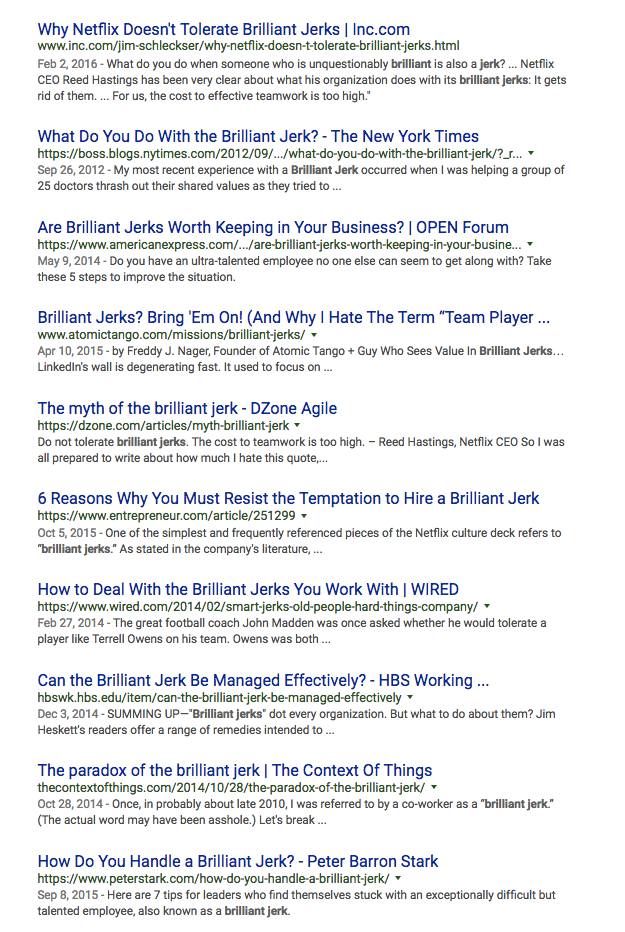If It Walks Like A Jerk And Talks Like A Jerk
Call him an asshole, not “brilliant,” and don’t hire him.

Last weekend, Susan J. Fowler, a former engineer for Uber, lit that company’s pants on fire with a single very good and very upsetting-to-read blog post filled with detailed accusations of repeated sexual harassment and basically corporate malfeasance at some pretty high levels. It painted a pretty dark picture of the corporate culture:
Over the next few months, I began to meet more women engineers in the company. As I got to know them, and heard their stories, I was surprised that some of them had stories similar to my own. Some of the women even had stories about reporting the exact same manager I had reported, and had reported inappropriate interactions with him long before I had even joined the company. It became obvious that both HR and management had been lying about this being “his first offense”, and it certainly wasn’t his last. Within a few months, he was reported once again for inappropriate behavior, and those who reported him were told it was still his “first offense”. The situation was escalated as far up the chain as it could be escalated, and still nothing was done.
Reflecting on one very, very strange year at Uber
Shortly thereafter, The New York Times’ Mike Isaac reported on the fallout from that post—a 90-minute all-hands meeting, including board member Arianna Huffington, who was presumably there to be The Woman On The Stage, a.k.a. The Mom, a.k.a. the responsible one here to ensure the women and also the closely listening public that Something Will Be Done About This because Travis Kalanick is the boob-loving frat-boy that no one can take seriously anymore and he needs a real grown-up and a former attorney general onstage so you know he’s for real. The piece ended with a kicker that made me spit out my bile:
At the Tuesday all-hands meeting, Ms. Huffington, the Uber board member, also vowed that the company would make another change. According to attendees and video of the meeting, Ms. Huffington said there would no longer be hiring of “brilliant jerks.”
This term, “the brilliant jerk,” has been around for a while in corporate lingo. I remember first reading about in a New York Times blog post (R.I.P. blogs) in 2012. (PLEASE DON’T ACTUALLY ME ABOUT REED HASTINGS, YOU JERKOFF, HE’S TWO GRAFS DOWN.) I guess there was a series about Being The Boss and the URL was boss.blogs.nytimes.com 🙁 What a world! Anyway it was a sort of advicey column about what to do about that one archetype, the Brilliant Jerk, in your workplace. It was fun to read when it came out because everyone got to speculate about who their brilliant jerk was.
What Do You Do With the Brilliant Jerk?
But everyone already knows who the brilliant jerk at their workplace is because it’s the raging asshole!! It’s not hard to tell. And yet somehow as long as we’ve had a word for it, and probably even longer, we’ve wrung our hands over whether or not to cope with this fucktard over here because—wait for it—HE’S BRILLIANT! Indeed, there is a whole wealth of recent e-literature regarding how to solve an incorrigible problem like the Brilliant Jerk:

Reed Hastings, the CEO of Netflix, maybe probably coined the term in 2009 in a PowerPoint deck (sorry that’s just what they call it) about Netflix corporate culture. He wrote, “Brilliant jerks. Some companies tolerate them. For us, cost to effective team work is too high.” Yes, that is the origin myth of the Brilliant Jerk. That’s where he was born. It’s so weird that eight years after identifying him we just haven’t been able to figure out what to do with him! He’s just been sitting there this whole time! We’re just so pleased with this clever paradox; it rings a bell for everyone. We are enthralled by the Brilliant Jerk, because it’s so true, right? Wow.
So we keep letting him in. We keep bringing him back. And because we’ve kept him around, he thinks he is safe and in a good position at the office. He has nothing to fear, nobody’s watching him or disapproving. Maybe can get away with a drunken fondle at a boozy work event or a suggestive DM on the corporate-messaging system. The longer he stays, the more he tries, and the more he probably gets away with. Besides, what could you possibly say, he’s been here so long and contributed a lot to the company? The longer you let him stay, the more you give him permission to curdle your corporate culture.
I’ll tell you what: first of all, stop calling him that. Brilliant is just how we excuse Jerk. It’s how he gets away with bad behavior, like sexual harassment and insubordination (and yes, he is usually a he). Let me get all third grade on you for a second here: If you’re so brilliant, then why haven’t you figured out how to be good at your job? The jury is long out on the jerks’ performance: they may be highly productive, “but they are not, however brilliant business people,” wrote Cliff Oxford in the Times. This is because good business people, strangely enough, are good people.
Let’s try for a second to imagine a female jerk. A bitch, if you will. Has anyone in a corporate setting (i.e., not on feminist Twitter) ever defended a woman by offsetting her bitchiness with a defense about her first-class mind? No—her bitchiness is viewed as an undesirable trait in a coworker; so too should jerkiness be. And not one to be swept under the rug:
Occasionally, problematic managers who were the subject of numerous complaints were shuffled around different regions; firings were less common.
Indeed, the answer to the dilemma of that Times blog post :‘( was, “Get rid of the Brilliant Jerk as fast as you possibly can.” Better yet, don’t hire him in the first place. The way the announcement is worded in the Times piece, it’s as though Uber is putting an outdated affirmative-action policy to bed. “We won’t be doing the thing we’ve been doing in the past, because it worked in the short term, but proved bad in the long term.” That’s not good enough. Own up to your mistakes and fire some jerks.
